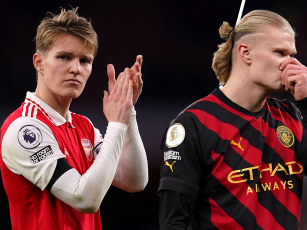Thirty years on from a famous FA Cup final win over Tottenham in 1987, Coventry City are in a worrying predicament.
The Sky Blues languish right at the bottom of the third tier English League One after 31 of their games of the season.
A full 11 points off safety, it looks like Coventry will go down to League Two and within one terrible season of dropping out of the Football League entirely.
For those of us, who grew up in the 1990s, Coventry City were just an established fact of life in the Premier League. When they were relegated from the top flight in 2001, they had been in the top division of English football for 34 years consecutively.
Yet relegation was part of a domino effect that has seen the club plummet away from their former glories and it is detailed in a book by Coventry Telegraph chief reporter Simon Gilbert titled Coventry City: A Club Without a Home: The Fight Behind the Sky Blues' Return from Exile.
You can listen to the full interview with Simon Gilbert on the podcast player or on iTunes:
Gilbert joined us on Team 33 to talk about the events which have led to Coventry's decline and the deep-seated divisions between much of the fanbase and the clubs' current owners Sisu.
Stadium issues have been the key theme from 2001 to the present day. Towards the end of the 1990s as many clubs began considering the necessity of moving grounds, Coventry made the decision to leave their long time home Highfield Road for the newly built Ricoh Arena.
The stadium move wouldn't happen until 2005 by which time relegation from the Premier League meant circumstances had markedly changed.
"The reason they decided to knock Highfield Road down and build the Ricoh was because they recognised the limitations of Highfield Road. There wasn't a great deal of room for expansion," Gilbert explained.
However, once the move to Ricoh happened, it eventually got to a point that the football club did not own the new stadium - even in part - and as we discussed with Gilbert, the rent agreement in place meant Coventry did not earn any matchday revenue.

Coventry City's players and the referee remove tennis balls from the pitch during the match against Millwall. Picture by Barrington Coombs EMPICS Sport
"When they moved to the Ricoh Arena they were paying £1.3 million a year in rent. Now, the idea behind that was the rent had to be a certain level in order for the council to justify building the stadium," Gilbert explained.
"But the idea was that Coventry City would own half the stadium and that the profits they would generate from the stadium would more than cover the rent and it wouldn't be a problem. But they sold their half share in the stadium and also sold all their income in revenue streams from the stadium as a result which meant that they were left with £1.3 million in rent and with all these bills that would have come in income on the other side of the coin. So they were in a really, really bad position and you have to really question the judgement of the people involved in terms of why they took that deal. And if you do ask these people why they did it, they don't seem to give you a sensible answer."
In 2013, while disputing the rent agreement, Coventry upped sticks and moved their matches to the town of Northampton to play at Sixfields Stadium in an arrangement that would last until 2014 when they returned to the Ricoh.
In the meantime, Wasps Rugby club now own the Ricoh Arena and in 2018, there is a possibility that Coventry City will have to move away after the expiration of their current deal at the arena.
@NewstalkSport @Raftastico @seocoffey @TheSkyBlueTrust thanks guys. Great to talk. Much more detailed analysis here! https://t.co/3ou91MBYuo
— Simon Gilbert (@TheSimonGilbert) February 15, 2017
The other issue that continues bubbling under the surface is the unpopularity of Sisu, the London based hedge fund which owns Coventry and has been reluctant to sell.
In December 2007, they took over the club, preventing Coventry from going into administration and incurring a 10 point penalty.
However, as time has gone and fortunes on the pitch dip, Sisu have become deeply unpopular leading to protests from fans that have gone from pitch invasions to throwing tennis balls on the pitch.
The Coventy Telegraph's reporters are also banned by the club from press conferences and speaking to players and the managers and Gilbert explained why Coventry City have decided to do that.
Download the brand new OffTheBall App in the Play Store & App Store right now! We've got you covered!
Subscribe to OffTheBall's YouTube channel for more videos, like us on Facebook or follow us on Twitter for the latest sporting news and content.








